In today's fast-paced digital world, having an online presence is crucial for any startup. Starting a startup blog is an effective way to build your brand, establish authority, and connect with your target audience. A blog not only helps you showcase your expertise and share valuable insights, but it can also drive traffic to your website and generate leads. There are hundreds of startup blogs one can find on the internet to get inspiration. In this article, we will guide you on how to start your startup blog with the best inspirational startup blogs.
- 10 Best Startup Blogs
- Why Startup Blogs?
- How to Start a Startup Blog
- Step 1. Identify Your Target Audience
- Step 2. Choose a Blogging Platform
- Hyvor Blogs is simple, easy, and fast
- Hyvor Blogs supports multiple languages
- Custom domains
- Right-to-left (RTL) Language supported
- Host wherever you like
- In-built SEO Analyzer
- In-built Link Analyzer
- Chat GPT Integration
- Excalidraw Integration
- Google Fonts, Locally
- You own your blog
- Import from anywhere
- User-friendly console
- Custom themes
- In-built SEO
- Free Commenting System
- Developer-friendly
- Maintenance and Security
- Easy to setup with essential tools
- Hyvor Blogs is more affordable than Any Other Blogging Platform
- Step 3. Set Your Blog's Goals
- Step 4. Develop a Content Strategy
- Step 5. Create High-Quality Content
- Step 6. Promote Your Blog
- Step 7. Engage with Your Readers
- Step 8. Track and Analyze Your Success
- Conclusion
- References
10 Best Startup Blogs
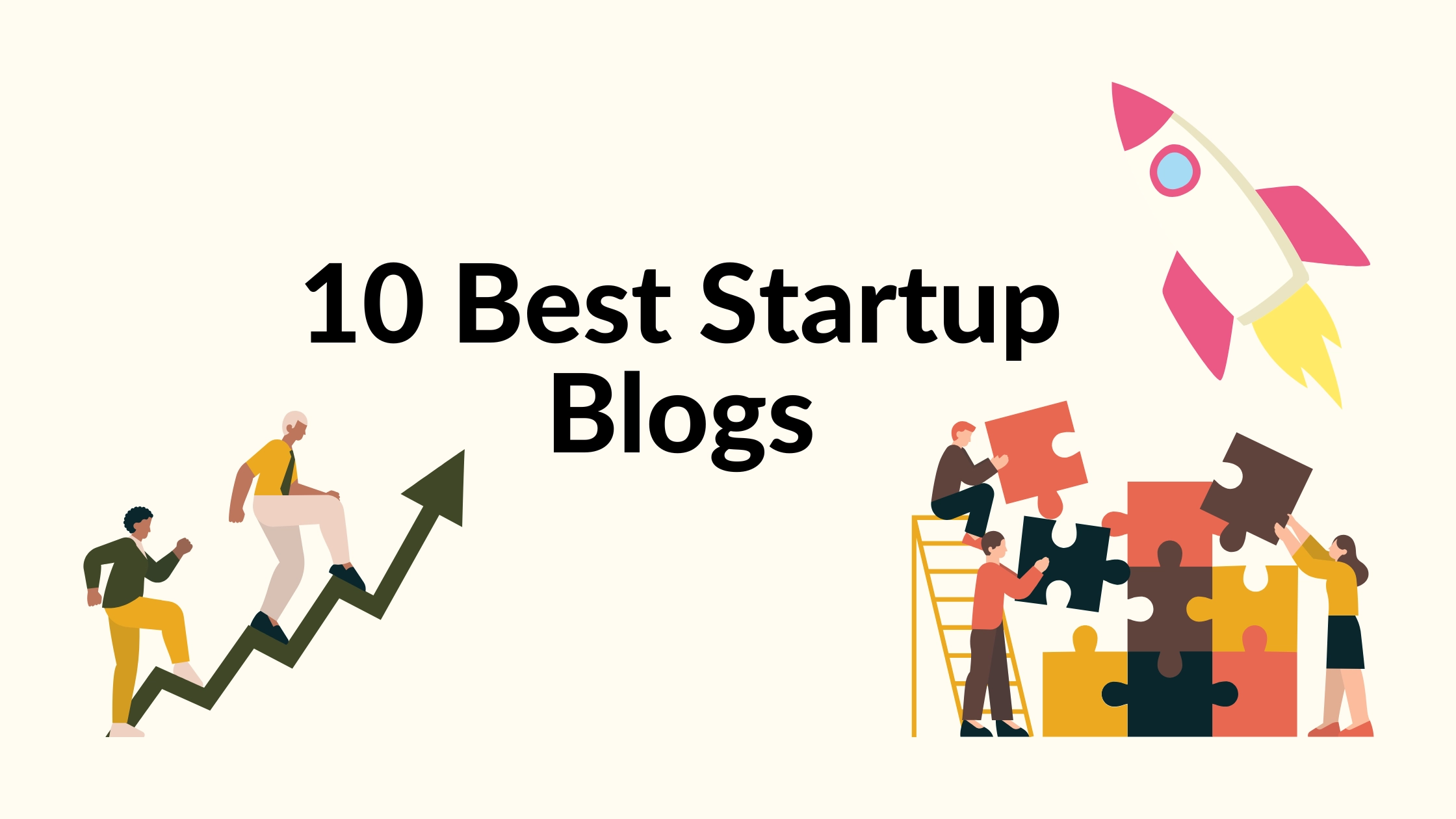
What is the most essential requirement for any successful startup? An IDEA right? Yes, you will eventually require much more than that, but the idea is always the first step. The ideas that drive the startup industry are big, disruptive concepts that have the potential to change the world. While they don't always work, the benefits can be enormous when they do.
Ideas can strike you at unexpected times—in the bath, in the park, or when you should be thinking about something quite other. Sometimes, though, you just can't wait for the next lightning strike. Where do you seek out ideas? It is best to start by seeking guidance from others who have been in your shoes—that is, searching for inspiration and hoping for their big break in the startup sector. Before moving straight on to how to start a startup blog, we have compiled a list of 10 best startup blogs to give you inspiration before starting your startup blog; as a long-term plan to keep you informed and to keep your company ideas fresh.
1. Andrew Chen
Andrew Chen is one of the most recognized product specialists in the startup sector. He led investments in freemium and consumer-focused SaaS at Andreessen Horowitz and played a major role in Uber's early world domination strategy.
Andrew Chen's blog is a highly acclaimed and prominent blog for startup enthusiasts seeking ideas and knowledge in entrepreneurship. As a recognized expert in the sector, Andrew Chen offers readers useful material and practical advice on all elements of launching and building a successful startup. His blog covers a wide range of topics pertinent to prospective entrepreneurs, including product creation and growth techniques, as well as marketing hacks and user acquisition tactics. Beyond the instructive articles, Andrew Chen offers his own experiences and industry views, making his startup blog a must-read for anybody interested in starting their own business.
2. Paul Graham
For those who are interested in startups and want to become entrepreneurs, Paul Graham's blog is a goldmine of information. Graham contributes a plethora of knowledge and experience to his blog as a co-founder of the well-known startup accelerator Y Combinator. The startup community holds his work in high regard for its insightful suggestions and useful guidance. Graham addresses a wide range of subjects that are important for anyone attempting to navigate the startup scene, from talking about the principles of creating successful firms to examining societal and technological trends. Paul Graham's blog is a priceless resource for anyone looking for inspiration, direction, and a deeper comprehension of the startup ecosystem because of his distinct viewpoint and extensive knowledge of entrepreneurship.
3. On Startups
"On Startups" is a widely recognized blog dedicated to providing valuable insights, advice, and resources for entrepreneurs and startup enthusiasts. Founded by entrepreneur and investor Dharmesh Shah, the blog offers a wealth of knowledge drawn from Shah's own experiences as well as contributions from guest authors and industry experts.
The blog covers a diverse range of topics relevant to startups, including but not limited to entrepreneurship, technology, product development, marketing, and venture capital. Through a combination of articles, case studies, interviews, and how-to guides, "On Startups" aims to educate, inspire, and empower entrepreneurs to navigate the challenges of building and scaling successful businesses.
What sets "On Startups" apart is its practical approach and actionable insights, making complex concepts and strategies accessible to readers at various stages of their entrepreneurial journey. Whether you're a first-time founder looking to validate your business idea or an experienced entrepreneur seeking growth strategies, "On Startups" offers valuable advice and perspectives to help you succeed in the competitive startup landscape.
4. Startup Nation
StartupNation is a major online startup blog for startups that provides information, insights, and community support to budding entrepreneurs and small company owners. Founded in 2002, the site covers issues such as business strategy, funding, marketing, and operations, offering practical advice and success stories from seasoned entrepreneurs. It is a wonderful resource and supportive community for entrepreneurs trying to build or grow their businesses.
5. First Round Review
Startup owners looking for insights and helpful guidance can turn to the "First Round Review" blog, which is supported by well-known venture capital company First Round Capital. This blog addresses important subjects including product creation, team building, fundraising, and leadership, and includes interviews, case studies, and practical advice from seasoned business owners and industry leaders. The First Round Review provides insightful advice to assist entrepreneurs overcome obstacles and succeed in the cutthroat startup scene by emphasizing the delivery of practical experiences and implementable tactics.
6. Tomasz Tunguz
Tomasz Tunguz's blog is a go-to resource for entrepreneurs and startup enthusiasts seeking expert insights and analysis on key trends, metrics, and growth strategies in the startup ecosystem. As a venture capitalist at Redpoint Ventures, Tunguz offers a unique perspective derived from his experience working closely with early-stage startups. Through his blog, Tunguz shares actionable advice, data-driven analysis, and thought-provoking commentary on topics such as fundraising, product development, customer acquisition, and scaling businesses. With a focus on practical strategies and real-world examples, Tunguz's blog serves as a valuable resource for entrepreneurs looking to build and scale successful startups.
7. Chaotic Flow
Veteran counsel to startups and seasoned CEO Dave Kellogg writes a lively and intelligent startup blog called "Chaotic Flow". The blog provides a distinctive viewpoint on managing the turbulent and fast-paced world of startups, with a focus on the nexus of technology, business strategy, and leadership. Kellogg addresses issues including go-to-market plans, revenue development techniques, organizational dynamics, and SaaS (Software as a Service) business models in his stimulating essays. Kellogg offers entrepreneurs and startup leaders useful guidance, actionable insights, and real-world examples to help them succeed in the current competitive landscape. Kellogg draws from his vast experience in the tech business. "Chaotic Flow" provides insightful advice for creating and growing profitable enterprises in the middle of the craziness of startup life, regardless of your level of experience as a founder or entrepreneur.
8. Steve Blank
Steve Blank's blog is a must-read for entrepreneurs seeking practical advice and insights. Drawing from his extensive experience, Blank offers valuable strategies for customer development, lean startup methodologies, and innovation. His emphasis on customer-centricity and iterative approaches provides actionable guidance for startups at every stage. Whether you're a novice or a seasoned founder, Blank's blog is a treasure trove of wisdom to navigate the challenges of entrepreneurship effectively.
9. AVC
Author Fred Wilson, a well-known venture capitalist and co-founder of Union Square Ventures, runs the highly acclaimed startup blog AVC. Wilson draws from his vast experience working with early-stage startups to give observations, analysis, and ideas on a variety of startup ecosystem topics through his frank and approachable writing. AVC offers entrepreneurs at every stage of their journey useful lessons and practical assistance on issues including product development, market trends, and finance. AVC provides an abundance of information to assist you in navigating the difficulties of entrepreneurship, whether you're looking for advice on starting a business or insights on market trends.
10. ToAllStartups
"ToAllStartups" is a dynamic and informative blog dedicated to supporting entrepreneurs worldwide. Offering practical insights, resources, and success stories, it covers a diverse range of topics including business strategies, marketing tactics, and funding opportunities. Whether you're an aspiring founder or a seasoned entrepreneur, "ToAllStartups" provides valuable content to help you navigate the challenges of startup life and achieve success. Join our community today and take your startup to new heights!
I hope these resourceful blogs about startups will inspire you and give you ideas to start and maintain your startup blogging journey and your startup journey.
Now let’s see why you must start startup blog?
Why Startup Blogs?

Starting a startup blog is crucial regardless of any startup idea. Wonder Why? Here is why,
Builds Credibility and Authority
Your startup blog can help you to establish your startup as a “giant” in your industry. By sharing valuable insights, experiences, thoughts on leadership, and other relevant topics, you can build trust among your audience and position your startup as a credible one.
Increases Brand Awareness
One of the best ways to get more people to see your startup is by blogging. It helps you to increase organic traffic to your startup website or your business blog and increase brand awareness; among potential customers, investors, and partners by producing high-quality search-engine-optimized (SEO) content.
Generates Leads and Customers
A startup blog can serve as a powerful lead-generation tool for your startup. By creating content that addresses the needs and pain points of your target customers, you can attract qualified leads and nurture them through the sales funnel. Additionally, blog posts that showcase your products or services can help convert visitors into paid customers.
Supports Content Marketing Efforts
One of the main elements of content marketing is blogging. It assists you in producing and disseminating worthwhile content to draw in, hold on to, and engage prospective clients. You may expand your audience and get the most out of your content marketing efforts by combining your blog with other marketing platforms like social media, email newsletters, and guest blogging.
Facilitates Thought Leadership
A startup blog provides a platform for you to share your unique perspectives, insights, and experiences with your audience. By consistently publishing high-quality content that adds value to your readers, you can establish yourself and your startup as thought leaders in your industry, opening up opportunities for speaking engagements, media coverage, and strategic partnerships.
Supports SEO Effort
Blogging is a useful tactic for enhancing search engine optimization (SEO) for your startup and raising the visibility of your website in search engine results pages (SERPs). Regularly posting pertinent, keyword-optimized content will raise your website's search engine rating and increase organic traffic.
Fosters Engagement and Community Building
Using a blog as a platform, you can interact with your audience and create a brand community. In order to promote two-way connection and dialogue with your readers, encourage comments, feedback, and social sharing. You may maximize brand loyalty and develop brand advocates who will aid in the promotion of your startup by cultivating a devoted following of enthusiastic followers.
Now let’s see how to start a startup blog hassle-free.
How to Start a Startup Blog

Once you get a startup idea, it’s time to start startup blogging. Normally, when starting a blog, there are a few “MUST DOs” to be done. And when it comes to starting a startup blog, it applies the same but with a few changes.
Step 1. Identify Your Target Audience
Before you start a startup blog, it's important to determine who your target audience is. Just having a startup idea and the courage to start working towards is not enough in the long term. So it is important to have a clear understanding of your target audience which will help you tailor your content to their needs and interests.
To make this step easier, ask yourself the following questions :
Who are my potential customers?
What are their pain points and challenges?
What kind of information or solutions are they looking for?
By answering these questions, you can create content that resonates with your target audience and provides them with value.
Step 2. Choose a Blogging Platform
The next step is to choose a blogging platform. Selecting the right blogging platform is a crucial decision when starting a startup blog. The platform you choose will impact the functionality, customization options, ease of use, and scalability of your blog. So, when choosing a blogging platform for your startup blog, consider factors such as ease of use, customization options, scalability, cost, and technical proficiency. It's essential to select a platform that aligns with your goals and allows you to create a blog that reflects your brand's identity and values. Additionally, ensure that the platform you choose provides adequate support and resources to help you grow your blog over time.
There are plenty of blogging platforms you can try before you choose one. You can just google “blogging platforms”, “SaaS CMS (if you are planning to choose a SaaS CMS as a long-term investment for your saas company blog)”. Among those search results, you may find, Hyvor Blogs, Ghost, WordPress, Webflow, Blogger, Medium, Joomla, etc.
And of course, it is a must to choose the necessary apps for blogging which you will need to maintain your blog. But that is not a big deal if you choose a blogging platform that covers everything for you. Hyvor Blogs is an all-in-one blogging platform that covers everything a blogger needs.
Let’s see why Hyvor Blogs is the ideal blogging platform for you.
Hyvor Blogs is an all-in-one blogging platform that makes blogging very simple. With Hyvor Blogs you can start and publish your blog in a couple of minutes.
Here are the key features of Hyvor Blogs which make it the best choice for you.
Multi-language support by default - You can add new languages to your blog as you prefer. You can start multi-language blogging using different languages and grow your audience. It is just a piece of cake.
Auto translation - No tedious tasks of translating blog posts into different languages. With just one click, you can translate your blog posts easily.
Powerful rich text editor - Hyvor Blogs’s carefully crafted rich text editor makes writing blog posts effortless. Add headings, blockquotes, images, embeds, code blocks, and more.
Customizable Themes - Raydo, Pela, Zing, and more. All of these themes are editable and completely free for anyone using Hyvor Blogs. You can make your own theme for your blog if default themes do not satisfy you.
Right-to-left (RTL) languages supported
Free commenting system - Hyvor Talk is completely FREE in Hyvor Blogs. So, you can have a commenting space on your blog at no cost. A blog without a commenting space is dull.
Real-time SEO analysis - This real-time SEO analyzer gives you suggestions to improve your post's SEO as you write. It checks for keyword usage, internal and external links, and more SEO-related factors.
GPT (AI) for content creation - Chat with GPT to generate content, blog post outlines, and more. GPT is integrated directly into the editor, making it easy to use generated content in your posts.
Broken link analyzer - Hyvor Blogs’s link analyzer checks for broken links in your posts as you write. It also runs a bi-weekly check on all your posts and notifies you via email if any links are broken.
Mobile friendly - You can blog from anywhere using any device. Even using your mobile.
Google Fonts, locally
Privacy protected
Complete control - HB does not inject ads, trackers, affiliate links, or paywalls into your blog. It's your blog - You decide everything!
Data Ownership - You own the content you write. You can export your content and move to another platform anytime.
User-friendly blog console - Easily manage your blog with a user-friendly blog console.
Team collaboration - Invite your team to work with you.
In-built SEO - All you need for technical SEO is in-built in HB
Easy to set up with essential tools
Sub-directory hosting - Host your blog at /blog of your web app: Cloudflare workers, Next.js, Laravel, Symfony.
Excalidraw Integration - The famous drawing tool, Excalidraw, is now embedded within the image uploader to help you quickly draft a sketch as you write.
Plus, Hyvor Blogs is completely developer-friendly.
Data API - Access public data of your blog as JSON using our Data API. For example, you can use it to get the latest posts on your blog. The Data API makes Hyvor Blogs work as a headless CMS for an alternative front-end.
Delivery API - Delivery API allows you to host your blog within a subdirectory of your web applications, with the help of Webhooks.
Console API - This is the same API we use in the Console. Automate some of your administrative tasks, or you can even build your own console.
Webhooks - Ping a URL when something happens on your blog (ex: when a post is created).
Not only that but also HB supports web framework integrations such as Symfony, Laravel, etc.
Hyvor Blogs is simple, easy, and fast
Hyvor Blogs focuses on one thing only: Blogging. It is an all-in-one blogging platform that has everything you need for blogging built-in.
Hyvor Blogs is faster
If you think about it, a blog is a very simple type of website. It has multiple pages. In CMSs like WordPress, these pages are dynamically generated (again, remember, WordPress is built to satisfy everyone). You need to purchase a separate caching plugin to make WordPress faster - in most cases, it can backfire and clash with other plugins on your WordPress website.
Hyvor Blogs is designed to highly cache your blog and readily serve it to all your visitors. You don’t have to spend money on external plugins. Want to see how fast it is? This very blog is run on Hyvor Blogs. You can navigate between pages to see how fast it is. While you can purchase plugins, optimize theme code, and hire a developer to make other CMSs faster, why bother? Hyvor Blogs is super fast by default.
Hyvor Blogs supports multiple languages
Hyvor Blogs is marketed as a “multi-language blogging platform”. It is the best and easiest platform if you are planning to scale your blog to multiple regions. Everything in your blog (posts, tags, author names, metadata, etc.) is translatable.
Our multi-language blogging article explains in depth the benefits of having a blog with multiple languages. In short, you can easily reach a global audience and improve your traffic and sales. Moreover, you do not need to hire a translator to translate your posts into multiple languages. Our AI-powered auto translator (powered by DeepL, the world’s best translation service) can translate your posts for you.
If you were to start a multi-language blog in other blogging platforms like WordPress, you would need to use an external plugin like WPML, which can cost you between $39 to $199. Not to mention the effort needs to install and update the plugin.
Note: Even if you do not plan to start a multi-language blog, you can use Hyvor Blogs. If you ever decide to go multi-lingual, you can easily add new languages and start translating your posts gradually.
Custom domains
You can set up your own custom domain blog, with no hidden costs, and no additional charges, just start blogging using a custom domain with few clicks.
Right-to-left (RTL) Language supported
Hyvor Blogs explicitly support right-to-left languages like Arabic, Farzi, Hebrew, etc. So if you are a blogger looking to blog using an RTL language or looking to run your blog in an RTL language, while it is already running on LTR language, Hyvor Blogs is the best choice for you. HB’s themes are also RTL language supported so you do not have to worry about that.
Host wherever you like
Hyvor Blogs can be hosted on the given free subdomain (on hyvorblogs.io), on your own custom domain, or in a subdirectory. If you have a web application (ex: Laravel), you can easily set up to host your blog on a sub-directory.
Buying a custom domain involves separate costs but with Hyvor Blogs you will only have the cost of the domain; nothing else.
In-built SEO Analyzer
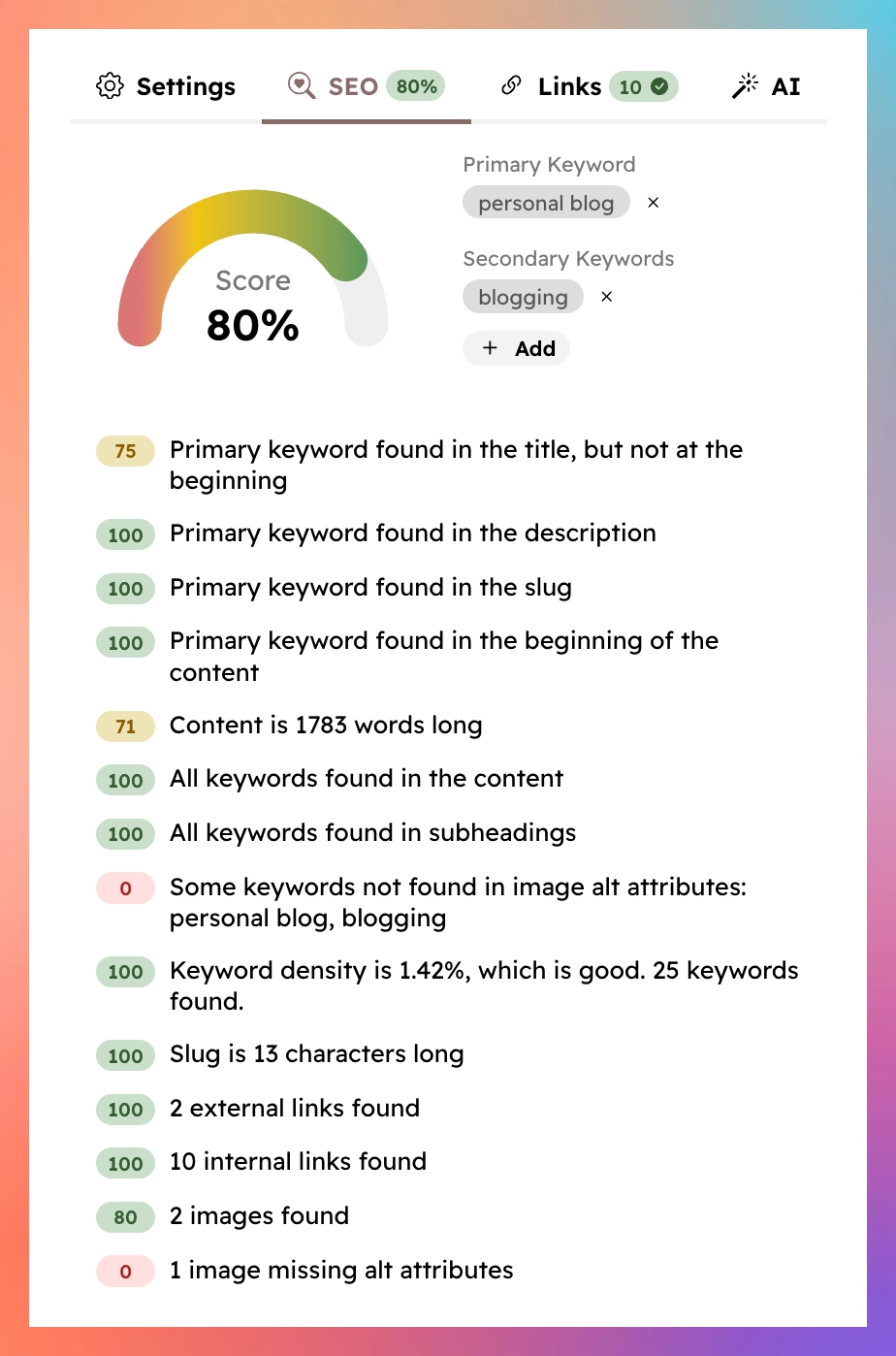
Hyvor Blogs has a real-time SEO analyzer in the post editor to help you with on-page SEO. You know how SEO is important when you are running a blog right? Everything depends on SEO. Therefore you have to think about all SEO factors when creating content; that’s quite hard and you might miss things. That is why having such a feature is important. It will help you identify common issues and better optimize your blog posts for search engines.
In other blogging platforms, you have to install SEO plugins in order to do SEO analysis. But in. Hyvor Blogs you do not have to pay and install plugins as this SEO analyzer is there already by default for you to use.
In-built Link Analyzer
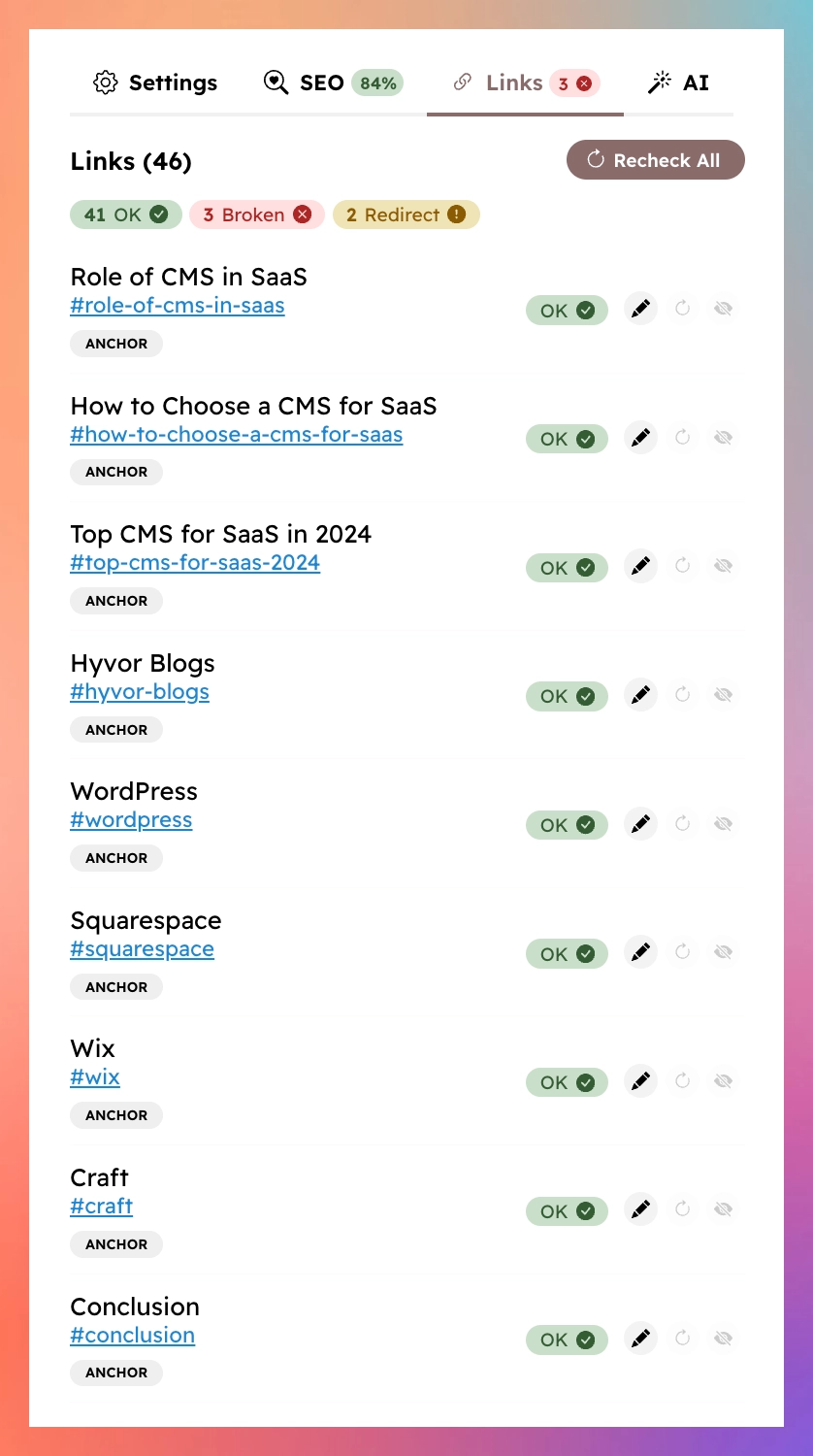
According to a study by Ahrefs, 66.5% of links become broken within 10 years. Broken links can significantly harm your blog’s user experience and SEO. This link analyzer analyzes all the links and lets you know their status. It consists of 2 separate features:
Link analysis: It gives real-time feedback for you as you write your post. This will help you publish your blog post without any broken links. This checks for internal, external, and even anchor links in your post.
Full blog link analysis - This does a bi-weekly (14 days) full-blog analysis checks for all links in your posts and provides you with a report via emails. Learn More.
Chat GPT Integration
Hyvor Blogs has integrated chat GPT 3.5 for you to easily generate content and add it to the editor. Here is a demo of how it works.
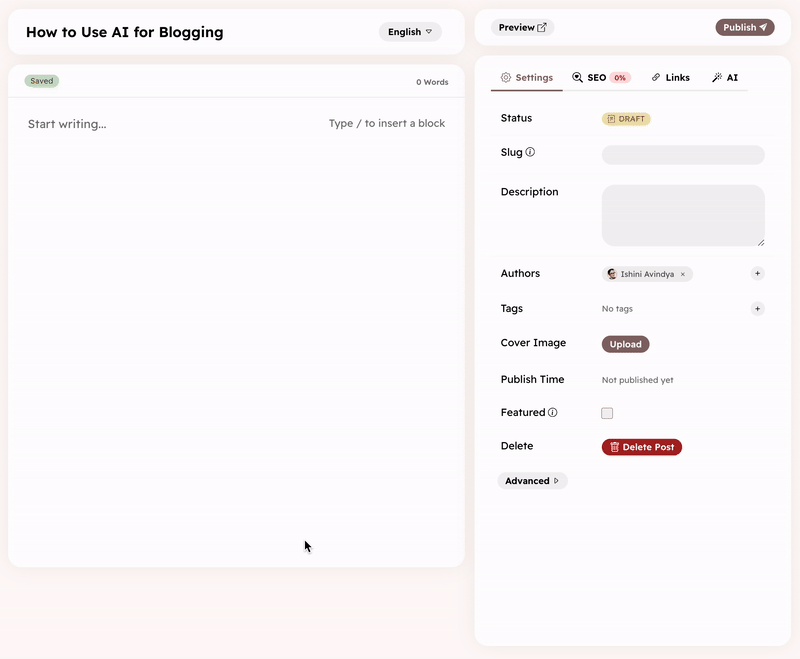
You can generate content and use pre-built commonly used prompts such as SEO keyword ideas, FAQ generators, etc.
Excalidraw Integration
The famous drawing tool, Excalidraw, is now embedded within the image uploader to help you quickly draft a sketch as you write.
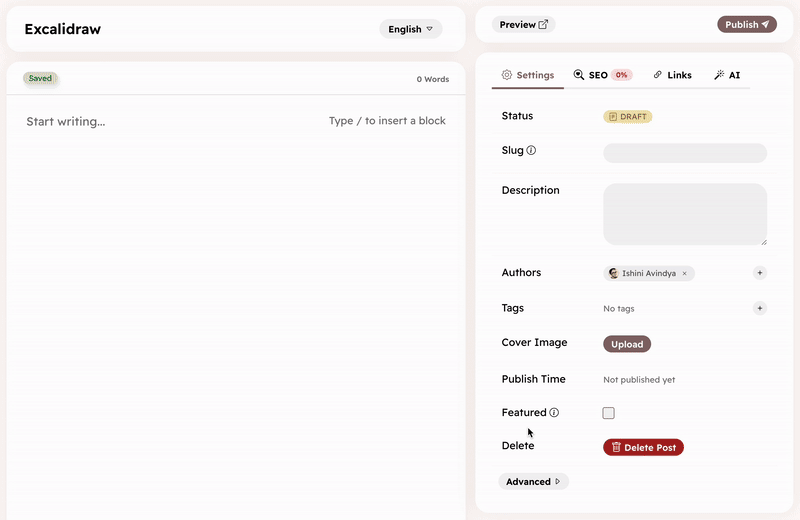
Google Fonts, Locally
With this, you do not have to deal with multiple CSS files, @font-face rules, uploading assets, etc. Or, you do not have to use a third-party service like Google Fonts, which comes with a privacy liability. This feature combines the simplicity of Google Fonts and the privacy of locally hosting the fonts. All the fonts (CSS and font files) are served directly from your domain - no requests are sent to Google or any other third party. Learn more.
You own your blog
Hyvor Blogs does not own your blog. In other words, your content and your whole blog are owned by you. Likewise, you have complete control over your blog. You own the content you write. You can export your content and move to another platform anytime. And, Hyvor Blogs does not inject ads, trackers, affiliate links, or paywalls into your blog. It's your blog - You decide and control everything!
Import from anywhere
You can now import posts from any blog using a sitemap. All you have to do is submit a sitemap and provide some CSS selectors to help the importer find content and metadata. Then, test and import! Check the documentation: https://blogs.hyvor.com/docs/import-sitemap
Plus, you have Hyvor Blog’s team support 24/7 in any case.
User-friendly console
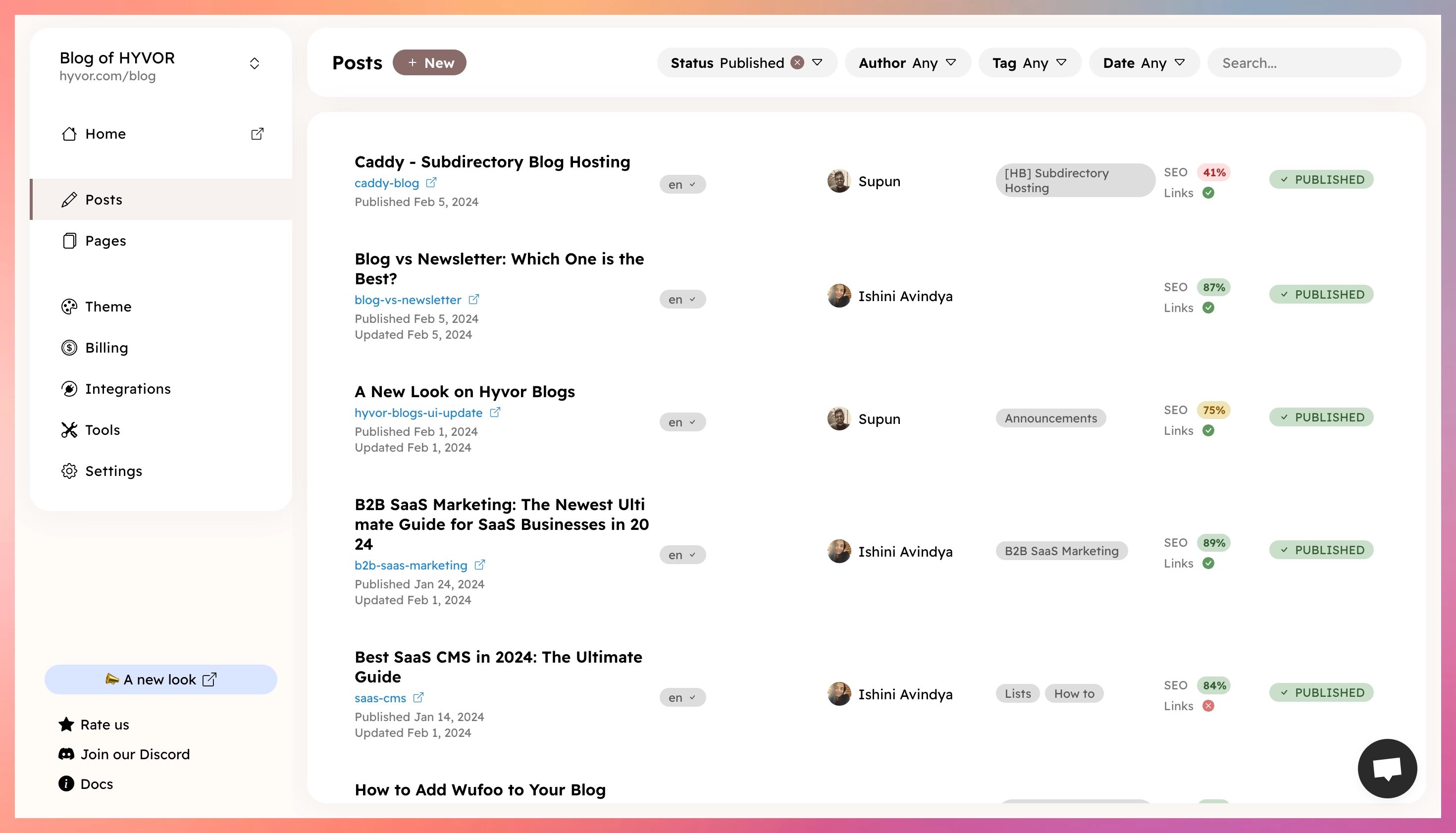
Hyvor Blogs’ Console is super simple and user-friendly. You can easily manage all your posts.
Custom themes
Hyvor Blogs’ themes are streamlined. All themes work the same way following a specific set of guidelines, ensuring the quality of all the themes.
Most blogging platforms offer several free themes, but most third-party themes are paid (around $99 per theme). In Hyvor Blogs, official blog themes are free and open-source. The Hyvor Blogs team is working hard on introducing new themes as well. All official themes will forever be free. Therefore, you can easily switch between themes and find out the best one for you.
Here is the latest theme published “Raydo”. You can discover Hyvor Blogs’s themes here.

You can also develop a completely custom theme for your blog. A beautiful and attractive theme makes your blog visitors feel interested in spending time on your blog.
In-built SEO
In other blogging platforms, you need plugins like Yoast to make technical SEO work (adding meta tags, etc.). Those plugins add more costs. In Hyvor Blogs, SEO is in-built. Meta tags, XML sitemaps, robots.txt, and everything else related to SEO come by default and are easily customizable.
Even if you are a multi-language blogger, Hyvor Blogs takes care of multi-language SEO.
Free Commenting System
Hyvor Blogs facilitates your blog with their commenting system Hyvor Talk for FREE. How cool is that? Having a commenting space for your blog users is an essential part of having a successful blog as user interaction and engagement is what a blogger expects.
Developer-friendly
Hyvor Blogs is a product developed by developers who care about the inner workings of the software.
Data API - Allows you to access public data of your blog. For example, you can use it to get the latest posts on a separate website. It can also make Hyvor Blogs work as a headless CMS for an alternative front-end.
Console API - This is the same API we use in the Console. Automate some of your administrative tasks, or you can even build your own console.
Delivery API - Delivery API allows you to host your blog within a subdirectory of your web applications, with the help of Webhooks.
Webhooks - Ping a URL when something happens on your blog (ex: when a post is created).
Web frameworks integrations - Host your blog within your web applications such as Laravel and Symfony.
Syntax Highlighting - 100+ languages, 30+ themes supported
Maintenance and Security
If you are using a blogging platform like self-hosted WordPress, enhancing blog security is your responsibility. You have to keep WordPress up-to-date. Updating to a new version can be tricky and may need technical knowledge.
In Hyvor Blogs, everything is managed and hosted. You do not have to worry about updates or security.
Easy to setup with essential tools
As a blogger, you may run ads, set up data collection forms, marketing tools, etc. For example, Google Adsense, Google Analytics, Typeform, Mailchimp, ConvertKit, and Memberstack, etc. So, working with those tools is way too easier with Hyvor Blogs.
Here are our guides to essential tool integrations.
Hyvor Blogs is more affordable than Any Other Blogging Platform
Hyvor Blogs pricing is based on the number of admin users (writers) on your blog and the total amount of Storage used. There are no feature limitations. See pricing for up-to-date information.
2 Users - $9/month
5 Users - $19/month
15 Users - $49/month
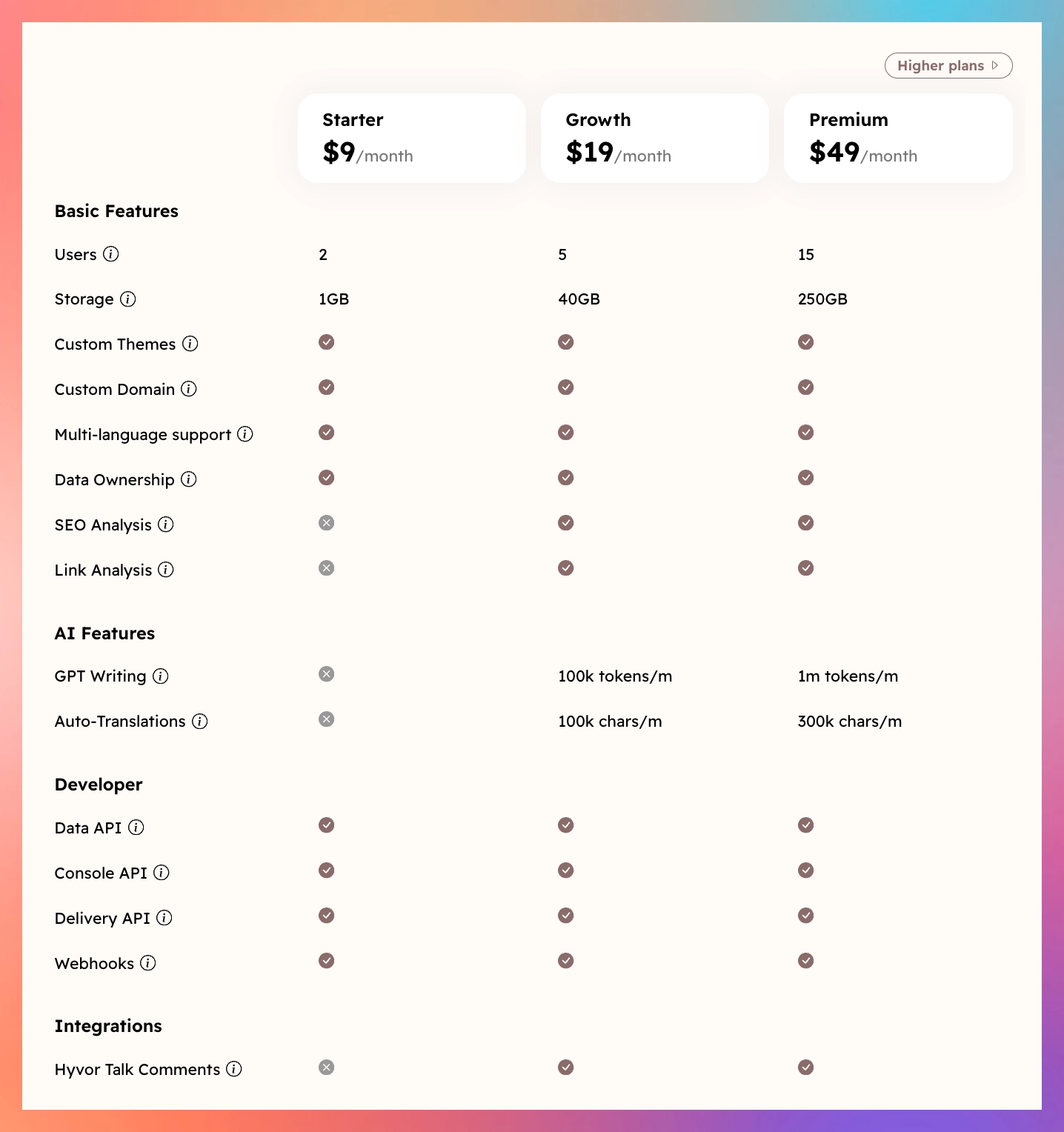
Note that you don’t have to pay for any of the features or themes additionally.
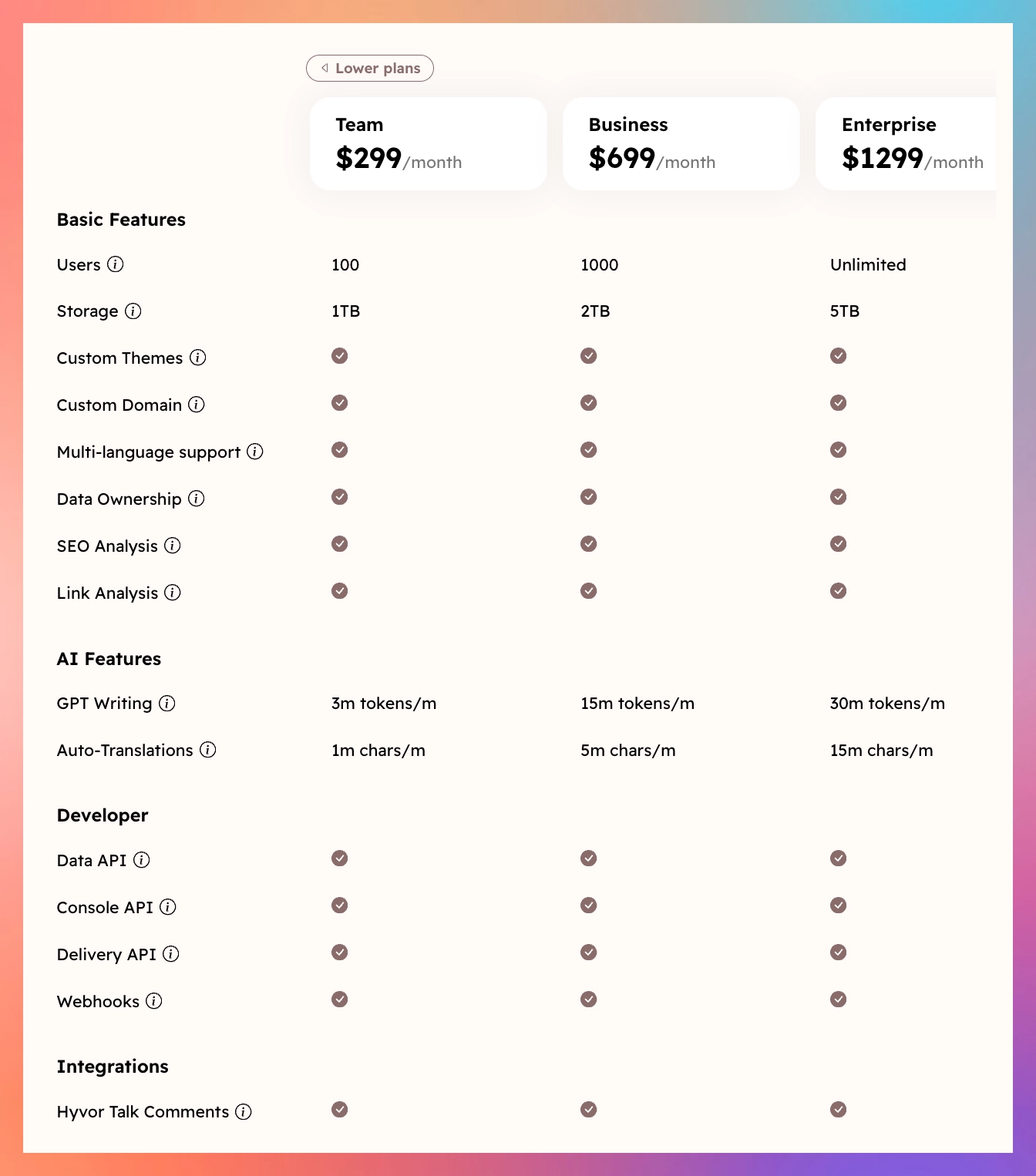
Hyvor Blogs' pricing plan is more affordable and inclusive, with all features available on a single plan. This makes it a good option for users who want to blog freely without breaking the bank.
Step 3. Set Your Blog's Goals
Setting clear goals for your startup blog will help you stay focused and measure your success. Ask yourself what you want to achieve with your startup blog. Some common goals include:
Building brand awareness
Generating leads
Establishing thought leadership
Driving traffic to your startup website
Share experience
By defining your goals, you can shape your content strategy accordingly.
Step 4. Develop a Content Strategy
A well-defined content strategy is essential for a successful blog for startup. As a start, you can start writing about your startup idea from the very beginning to anything you do for your startup and any idea you get. Basically, at the very start of your startup blog, it is quite like journaling because all you have to do is create content about your decisions, and new strategies for working towards your new startup idea.
Plus, you can start meaningful discussion content with your audience. As time passes by, you can start brainstorming content ideas and start creating content that your audience is more interested in.
Create an editorial calendar to plan your content in advance. This will help you stay consistent and ensure you cover a variety of topics. Mix up your content formats (such as articles, videos, or infographics) to keep your blog engaging and appealing to different types of readers.
Step 5. Create High-Quality Content
Great content is key to attracting and retaining readers. Focus on creating content that is informative, actionable, and unique. Share your expertise, provide insights, and offer solutions to your audience's problems. Use a conversational tone and avoid jargon to make your content accessible.
Readers/audience loves to have interactive informative content. Try to create content that makes them more engaged with your blog.
Don't forget to optimize your blog posts for search engines. Use relevant keywords in your titles, headings, and throughout your content. This will help improve your search engine rankings and increase organic traffic to your blog.
Step 6. Promote Your Blog
To maximize the reach of your blog, don't forget to promote it through various channels. Leverage your social media platforms to share your blog posts with your followers. Engage in relevant online communities and forums to establish yourself as an industry expert and share your blog posts when appropriate.
Consider guest blogging on other industry-related websites. This will help you expand your reach and attract new readers. Additionally, collaborate with influencers or other industry experts to co-create content or participate in interviews.
Step 7. Engage with Your Readers
Engaging with your readers is crucial to building a loyal audience. Respond to comments on your blog posts, ask questions, and encourage discussions. Listen to feedback and address any concerns or questions raised by your readers.
Add a commenting space for them to interact with you and other fellow readers too.
Consider creating an email list to stay in touch with your audience. Offer a newsletter subscription and regularly send updates and exclusive content to your subscribers.
Step 8. Track and Analyze Your Success
Measure the success of your startup blog by regularly tracking and analyzing your metrics. Use tools like Google Analytics to monitor your website traffic, bounce rate, and user engagement. This data will help you identify areas of improvement and refine your content strategy.
Conclusion
In conclusion, starting a startup blog can be a powerful tool for building your brand, establishing thought leadership, and engaging with your target audience. By identifying your audience, setting clear goals, developing a content strategy, and promoting your blog, you can create a successful online presence for your startup. Remember to consistently provide valuable and high-quality content and engage with your readers to build a loyal and engaged audience.
Feel free to let me know if you have any questions, or suggestions, by commenting down below.

Comments